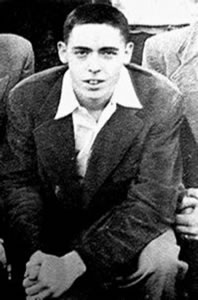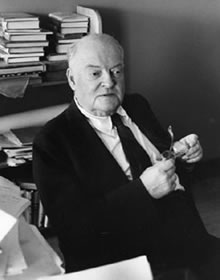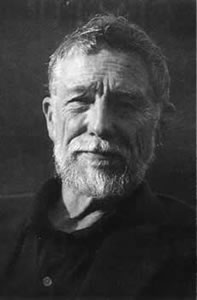De Amerikaanse schrijver Thomas Pynchon werd op 8 mei 1937 geboren in Glen Cove, Long Island, New York. Zijn vader, een landmeter, was een kennis van president Theodore Roosevelt. Thomas Pynchon zelf verliet de universiteit (Cornell, waar ook Kurt Vonnegut, 10 jaar eerder, studeerde) om twee jaar lang dienst te nemen bij de Amerikaanse marine. Na zijn terugkomst zei hij de wetenschap vaarwel en studeerde hij af met een graad in de filologie. Zijn eerste korte verhalen publiceerde hij in 1959. Na zijn studie ging hij werken voor Boeing in Seattle, Washington. Hij gaf zijn werk op om zijn eerste roman te voltooien, V. (1963). Terwijl verreweg de meeste auteurs zich verheugen in de belangstelling van de media (voor zover deze media zich voor hen interesseren), beslistte Pynchon volledig uit het publieke leven te verdwijnen. Nooit heeft hij een interview gegeven, en sinds 1963 zijn de enige tekens van leven zijn werk zelf, behoudens wat journalistiek werk, enige recensies van andermans werk. Zijn hoofdwerk is Gravity’s Rainbow (1973, vertaald als Regenboog van Zwaartekracht). Dit werd bekroond met de belangrijkste literaire prijs in de VS, de National Book Award. De prijs werd opgehaald door een clown. Voor de William Dean Howells Medal, een vijfjaarlijkse prijs voor het belangrijkste Amerikaanse fictiewerk, bedankte hij met een briefje waarin stond dat er maar één manier is om “neen” te zeggen, en dat is “neen”. Ook werd hem een Pulitzer toegekend, maar de beslissing van de jury werd teniet gedaaan door de beheerders van deze prijs, omdat het book (o. a.) ‘obsceen’ zou zijn.
Uit: Gravity’s Rainbow:
“Kekeul? dreams the Great Serpent holding its own tail in its mouth, the dreaming Serpent which surrounds the World. But the meanness, the cynicism with which this dream is going to be used. The Serpent that announces, “The World is a closed thing, cyclical, resonant, eternally returning,” is to be delivered into a system whose only aim is to violate the Cycle. Taking and not giving back, demanding that “productivity” and “earnings” keep on increasing with time, the System removing from the rest of the World these vast quantities of energy to keep its own tiny desperate fraction showing a profit: and not only most of humanity – most of the World, animal, vegetable, and mineral is laid waste in the process. The System may or may not understand that it’s only buying time. And that time is an artificial resource to being with, of no value to anyone or anything but the Systems, which sooner or later must crash to its death, when its addiction to energy has become more than the rest of the World can supply, dragging with it innocent souls all along the chain of life. Living inside the System is like riding across the country in a bus driven by a maniac bent on suicide . . . though he’s amiable enough, keeps cracking jokes back through the loudspeaker . . .”

Thomas Pynchon (Glen Cove, 8 mei 1937)
De Amerikaanse schrijver Sloan Wilson werd geboren op 8 mei 1920 in Norwalk, Connecticut. Hij studeerde in Harvard en diende tijdens WO II in de Coast Guard. Wilson schreef vijftien boeken, waaronder The Man in the Gray Flannel Suit (1955) en A Summer Place (1958) die allebei verfilmd werden.
Uit: The Man in the Gray Flannel Suit
“A major, coming to squat beside him, said:” Some of these goddamn sailors got heads. They went ashore and got Jap heads, and they tried to boil them in the galley to get the skulls for souvenirs”.
Tom had shrugged and said nothing. The fact that he had been too quick to throw a hand grenade and had killed Mahoney, the fact that some young sailors had wanted skulls for souvenirs, and the fact that a few hundred men had lost their lives to take the island of Karkow—all these facts were simply incomprehensible and had to be forgotten. That, he had decided, was the final truth of the war, and he had greeted it with relief, greeted it eagerly, the simple fact that it was incomprehensible and had to be forgotten. Things just happen, he had decided; they happen and they happen again, and anybody who tries to make sense out of it goes out of his mind.”

Sloan Wilson (8 mei 1920 – 25 mei 2003)
De Amerikaanse schrijver en criticus Edmund Wilson werd geboren op 8 mei 1895 in Red Bank, New Jersey en werd opgeleid aan Princeton. Hij begon zijn carrière als een verslaggever voor de New York Sun, en diende in het leger tijdens de Eerste Wereldoorlog. Hij was hoofdredacteur van Vanity Fair magazine in 1920 en 1921, en werkte later bij de kranten de New Republic en de New Yorker. Wilson was geïnteresseerd in moderne cultuur in zijn geheel, en veel van zijn schrijfselen gaan buiten het gebied van de pure literaire kritieken. In zijn boek To the Finland Station bestudeerde hij het verloop van het Europese socialisme dat toeloopt op de aankomst van Lenin op het Finland Station in Sint-Petersburg als aanvoerder van de revolutie van de Bolsjewieken. Wilson’s vroege werken zijn erg beïnvloed door de ideeën van Freud en Marx, en hij had een diepe interesse in hun werk. Hij was een goede vriend van schrijver F. Scott Fitzgerald, en hij redigeerde Fitzgeralds’ laatste boek voor postume publicatie.
Uit: The Fifties
“Had dinner with Wystan Auden before Elena [ Wilson’s wife ] arrived. He was pleased at having what he described as an honor on the part of the Establishment. He has been made an honorary fellow (I think that is the phrase) of Christ Church [ College, Oxford ] . I gather that he can retire and live there for nothing. He thinks that “Down There on a Visit” is Isherwood’s best book — I was just in the middle of reading it. He says the disintegrating homo on his horrible island in Greece was a real person whom he knew and the only person he knew who would drink the spirits out of lamps when there was nothing else to be had. He thought that “Paul” was the best of the stories. I agreed with him when I came to read it; but the whole book is rather disgusting. I am getting sick of this subject. The attitude in these books toward homosexuality involves of course a revolt against society. See the diatribe of the man on the island about putting the heterosexuals in ghettos. Paul is made by Isherwood into a hero. But Genet is the best of these writers. He is the most in revolt, the most genuinely an outlaw. Cambridge, Spring 1962.”

Edmund Wilson (8 mei 1895 – 14 juni 1972)
De Amerikaanse dichter Gary Snyder werd geboren op 8 mei 1930 in San Francisco. Zijn werk werd beïnvloed door de Amerikaanse dichters Walt Whitman en Ezra Pound. Hij wordt gerekend tot de Beat Generation. Het werk van Snyder is doordrongen van een diep respect voor de natuur en doordrongen van Oosterse filosofie. In 1975 won Snyder de Pulitzer Prize voor zijn bundel Turtle Island.
Rolling In At Twilight
Rolling in at twilight — Newport Oregon —
cool of september ocean air, I
saw Phil Whalen with a load of groceries
walking through a dirt lot full
of logging trucks, cats
and skidders
looking at the ground.
I yelld as the bus wheeld by
but he kept looking down.
ten minutes later with my books and pack
knockt at his door
“Thought you might be on that bus”
he said, and
showed me all the food.
Manzanita
Before dawn the coyotes
weave medicine songs
dream nets — spirit baskets —
milky way music
they cook young girls with
to be woman;
or the whirling dance of
striped boys —
At moon-set the pines are gold-purple
Just before sunrise.
The dog hastens into the undergrowth
Comes back panting
Huge, on the small dry flowers.
A woodpecker
Drums and echoes
Across the still meadow
One man draws, and releases an arrow
Humming, flat,
Misses a gray stump, and splitting
A smooth red twisty manzanita bough.
Manzanita the tips in fruit,
Clusters of hard green berries
The longer you look
The bigger they seem,
`little apples’

Gary Snyder (San Francisco, 8 mei 1930)
De Deense schrijver Sophus Schandorph werd geboren op 8 mei 1836 in Ringstedt. Hij studeerde theologie in Kopenhagen, verwisselde die studie echter voor romanistiek en werd daarna leraar. Schandorph behoorde tot de schrijvers van de „Moderne doorbraak“ van 1871 die zich oriënteerden aan Brandes. Ook Toergenjev en Zola hadden invloed op hem.
Uit: Stina Becomes a Farmer’s Wife (vertaald door Sally Ryan)
“SINCE Midsummer Day not a drop of rain had fallen, and now August was nearing its end. The road looked like a trail of spilled flour winding through bare fields. The stubble land was cracked with drought. The fallow fields gleamed yellow agains
t crumbling grayish white soil. The low ditches were lined with ugly dusty grass, like long tangled wisps of hair. All growing things were drying up in an abandonment of despair. The light blue cloudless sky had tortured them too long. The sun, with its self-complacent smile, had scorched them so mercilessly, so continuously, that now, in spite of their burning thirst, they had grown too listless to implore the heavens for a drop of water. In all the dazzling whiteness of the landscape there was not a spot of deeper color to rest the weary eye.
A peasant girl of short, broad stature came walking along the road. Every step she took raised the dust like a low, dense cloud of steam. She seemed as resigned as the plants, but with a considerably greater vitality. No sentimental pity for her floral fellow-creatures moved her–at least she did not waste one glance on them. Only when a cow began to prance in the field she slightly turned her snugly kerchiefed head.”

Sophus Schandorph (8 mei 1836 – 1 januari 1901)
De Fransjoodse schrijver, vertaler regisseur en diplomaat Romain Gary werd geboren op 8 mei 1914 in Vilnius, Litouwen. Hij schreef vooral in het Frans, maar ook in het Engels. Na het overlijden van zijn vader trok hij met zijn moeder in 1928 naar Nice. Al in 1935 publiceerde hij twee korte verhalen in het tijdschrift Gringoire. Nadat hij in 1945 tot de diplomatieke dienst was toegetreden verscheen zijn eerste roman Éducation européenne. Het werk werd in zevenentwintig talen vertaald. Voor Les racines du ciel kreeg hij in 1956 en voor La vie devant soi in 1975 de Prix Goncourt. Hij is de enige schrijver die deze prijs tweemaal ontving.
Uit : La vie devant soi
« La première chose que je peux vous dire c’est qu’on habitait au sixième à pied et que pour Madame Rosa, avec tous ces kilos qu’elle portait sur elle et seulement deux jambes, c’était une vraie source de vie quotidienne, avec tous les soucis et les peines. Elle nous le rappelait chaque fois qu’elle ne se plaignait pas d’autre part, car elle était également juive. Sa santé n’était pas bonne non plus et je peux vous dire aussi dès le début que c’était une femme qui aurait mérité un ascenseur.
Je devais avoir trois ans quand j’ai vu Madame Rosa pour la première fois. Avant, on n’a pas de mémoire et on vit dans l’ignorance. J’ai cessé d’ignorer à l’âge de trois ou quatre ans et parfois ça me manque.
Il y avait beaucoup d’autres Juifs, Arabes et Noirs à Belleville, mais Madame Rosa était obligée de grimper les six étages seule. Elle disait qu’un jour elle allait mourir dans l’escalier, et tous les mômes se mettaient à pleurer parce que c’est ce qu’on fait toujours quand quelqu’un meurt. On était tantôt six ou sept tantôt même plus là-dedans.
Au début, je ne savais pas que Madame Rosa s’occupait de moi seulement pour toucher un mandat à la fin du mois. Quand je l’ai appris, j’avais six ou sept ans et ça m’a fait un coup de savoir que j’étais payé. Je croyais que Madame Rosa m’aimait pour rien et qu’on était quelqu’un l’un pour l’autre. J’en ai pleuré toute une nuit et c’était mon premier grand chagrin. »

Romain Gary (9 mei 1914 – 2 december 1980)
De Ierse schrijver Roddy Doyle werd geboren in Dublin op 8 mei 1958. Voor zijn eerste succes was hij leraar Engels en aardrijkskunde aan de Greendale Community School in Kilbarrack, Noord-Dublin, waar hij nog steeds woont. Zijn boeken gaan over de werkende klasse in Dublin, en zijn luchthartig maar hebben een serieuze ondertoon.
Uit: A Star Called Henry
“Henry rushed, he skipped all the way, but he dreaded the quick trip home and what he’d find there. Melody was about to give birth. Again. . . . They moved again, to a house on Summerhill. The room was smaller, the house meaner. . . . This was the room that Henry was rushing home to. This was their last chance, he was sure of it. He was panting when he turned onto Summerhill. He was getting old; he was twenty-six. His hair was greying, although he hadn’t seen it. He was stooped, carrying the heavy ghosts of his children. He could still feel them in his arms. He could smell them. Little Henry, little Lil. His love for them was an unending fight in his chest. He was always on the verge of seeing them. He didn’t sleep any more.”

Roddy Doyle (Dublin, 8 mei 1958)
De Engelse schrijfster Pat Barker werd geboren in Thornaby-on-Tees op 8 mei 1943. Zij publiceerde haar eerste roman, Union Street, in 1982. Beroemd werd ze met haar Regeneration trilogie, die handelt over WO I. Voor het derde deel daarvan, The Ghost Road, kreeg ze in 2001 de Booker Prize.
Uit: Double Vision (2003)
“Christmas was over. Feeling a slightly shame-faced pleasure in the restoration of normality, Kate stripped the tree of lights and decorations, cut off the main branches and dragged the trunk down to the compost heap at the bottom of the garden. There she stood looking back at the house, empty again now — her mother and sister had left the morning after Boxing Day — seeing the lighted windows and reflected firelight almost as if she were a stranger, shut out. A few specks of cold rain found her eyelids and mouth. All around her the forest waited, humped in silence. Shivering, she ran back up the lawn.
Gradually she re-established her routine. Up early, across to the studio by eight, five hours’ unbroken work that generally left her knackered for the rest of the day, though she forced herself to walk for an hour or two in the afternoons.
The weather turned colder, until one day, returning from her walk, she noticed that the big puddle immediately outside her front gate was filmed with ice, like a cataract dulling the pupil of an eye. She heated a bowl of soup, built up the fire and huddled over it, while outside the temperature dropped, steadily, hour by hour, until a solitary brown oak leaf detaching itself from the the frost-hard ground with a crackle that echoed tree fell onto through the whole forest.”

Pat Barker (Thornaby-on-Tees, op 8 mei 1943)
De Oostenrijkse schrijfster Gertrud Fussenegger werd geboren op 8 mei 1912 in Pilsen. Zij studeerde in Innsbruck en München geschiedenis, kunstgeschiedenis en filosofie. Zij begon met het schrijven van historische roman. Haar katholieke afkomst is van invloed op haar werk. Omstreden is haar houding in de tijd van het nationaalsocialisme toen zij door kon gaan met publiceren. Na de oorlog hield zij zich echter steeds weer bezig met de schuld van de Duitsers bezig.
Uit: Das Haus der dunklen Krüge
“Es war im Jahre 1870: im Hause Bourdanin wurde Hochzeit gefeiert.
Ehe die Sonne des langen glühendheißen Augusttages unterging, führte der Bräutigam, der kaiserliche und königliche Rittmeister Balthasar Bourdanin, seine jungangetraute Frau aus der Gesellschaft der Festgäste hinweg, in die für ihn eingerichteten Gemächer seines Vaterhauses. Die Stuben waren still und leer. Die Fenster standen offen; durch die weißen Schleierbahnen der Vorhänge drang, in schräge Balken gebrochen, das schwere gelbrote Abendlicht. Der Rittmeister warf Hut und Handschuhe ab und schwang seinen Hochzeitsrock über die Sessellehne. „Und nun”, sprach er, „nun sage mir auch, Marie, wie glücklich du bist.”
Zwischen den Fenstern hing ein Spiegel. Der Mann konnte es sich nicht versagen, sein Bild mit einem Blick zu messen. Balthasar Bourdanin war ein schöner Mann, fest und gedrungen gebaut, breitschultrig, rundköpfig, von kräftiger Hautfarbe und dunklem Haar. Die Nase stand zwar ein wenig schief in dem Angesicht und zielte mit ihrer Spitze abwärts gegen den buschigen Schnurrbart; doch stand sie nicht übel zu dem festen Mund, zu der starken Braue, zu dem dunkelrollenden hephai= stischen Blick. Der Rittmeister mußte es sich selbst gestehen, er war ein in seiner Art prächtiger Mann; darum hielt er die Frau, die ihn bekommen, für ein vollendet glückliches Geschöpf.”

Gertrud Fussenegger (Pilsen, 8 mei 1912)

